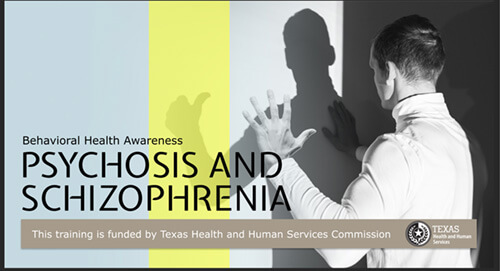Psychosis refers to a state of mind involving confusion between what is real and what is not real. Psychosis can affect all five of a person’s senses, their behavior, and their emotions. During a period of psychosis, the mind loses some contact with reality. A person may have experiences that are confusing and frightening not only for themselves, but also for those around them.
Symptoms of psychosis vary, but two common symptoms are hallucinations and delusions. Someone having a hallucination will hear, feel, see, smell, or taste something that is not actually happening in reality. Hallucinations, while not grounded in reality, are real to the individual having them so can be very scary and disrupting to life. A delusion is when a person maintains a strong belief in something that society would generally recognize as untrue or not based in reality. These beliefs can be frightening, confusing and disrupting to everyday life for the individual and those around them.
Psychosis generally occurs due to a combination of a person’s genetics and life experiences. Stressful events, the use of substances, or even physical health conditions (Dementia, Parkinson’s, etc.) can trigger psychosis for some individuals. The National Institute for Mental Health reports that as many as three out of every 100 people will experience an episode of psychosis in their life1. Sometimes extreme experiences can trigger a brief period of psychosis for someone that lasts for only a few days, then is never experienced again. For others, psychosis may be a feature of a mental health condition such as; schizophrenia, schizoaffective disorder, bipolar disorder (previously called manic depression), and major depression .
Schizophrenia
Schizophrenia is one specific mental health condition in which symptoms of psychosis occur. These symptoms may come and go and are often helped by medications. In addition to hallucinations and delusions, people living with schizophrenia may also experience decreased interest and motivation to do things, difficulty showing or interpreting emotions, or withdrawal from social activities and relationships. Cognitive symptoms are also experienced by individuals living with schizophrenia, such as poor ability to make decisions, focus on tasks, and using information right after it is learned.
Symptoms of schizophrenia generally develop between the ages 16 and 302. There is not a known cause of schizophrenia, but researchers believe that genes and their interaction with an individual’s environment do play a role in the development of the illness as well as the different balances of chemicals in the brain.
Substance-Induced Psychotic Disorder
Another cause of psychosis is from the use of drugs and alcohol, termed substance-induced psychotic disorder. This condition causes symptoms like hallucinations and delusions. In most cases the experience of these symptoms is short-term, lasting only hours or days. In rare cases, heavy and long-term use of a drug can cause psychosis that lasts for months or years, long after the drug has left the body. Treatment for substance induced psychosis involves both immediate treatment, including hospitalization, and long-term care, often in a residential setting and using medications and behavioral therapies.
Common Signs and Symptoms of Psychosis
Not everybody who experiences psychosis will have the same symptoms. Some individuals will experience some, while others may experience different ones.
- Hallucinations – hearing, seeing, tasting, smelling, feeling things that are not real
- Delusions – beliefs or ideas that are not true (i.e. believing they are a historical figure)
- Unusual thoughts or ideas
- Unusual body movements
- Difficulty concentrating or completing tasks
- Reduced expression of emotions
- Loss of interest in activities/socialization
- Incoherent or jumbled speech
- Suspiciousness of others
- Poor personal hygiene, sleep schedule, or eating habits
Psychosis and Schizophrenia Treatment
Many treatment options including medication, skills training, psychotherapy, and residential treatment facilities are available for people experiencing psychosis or living with schizophrenia. Complete recovery from psychosis is possible, depending upon what caused it, and hope is always a possibility regardless of a person’s condition. Research shows that if a person gets the right help within the first year of their first episode of psychosis, such as through coordinated specialty care, there is a better chance of them learning to manage the illness and live a higher quality of life.
To learn more about psychosis and schizophrenia and the various forms of treatment available, you can visit these sites:
If you experience difficulty accessing care or if you’re having issues with your health plan, the Texas Department of Insurance and the Texas Health and Human Services Commission’s Office of the Ombudsman might be able to help. They can also help you learn more about your rights.
Sources
1. National Institute of Mental Health: Fact Sheet: First Episode Psychosis.
https://www.nimh.nih.gov/health/topics/schizophrenia/raise/fact-sheet-first-episode-psychosis.shtml
2. Brain and Behavior Foundation: What is Schizophrenia?
https://www.bbrfoundation.org/what-is-schizophrenia-signs-symptoms-treatments#:~:text=Symptoms%20such%20as%20hallucinations%20and,childhood%2Donset%20schizophrenia%20is%20increasing

Learn more about Psychosis and Schizophrenia and other behavioral health conditions at our eLearning Hub. The quick, informative courses are designed to equip you with knowledge, resources, and hope for the future – for yourself or for someone else you care about.
